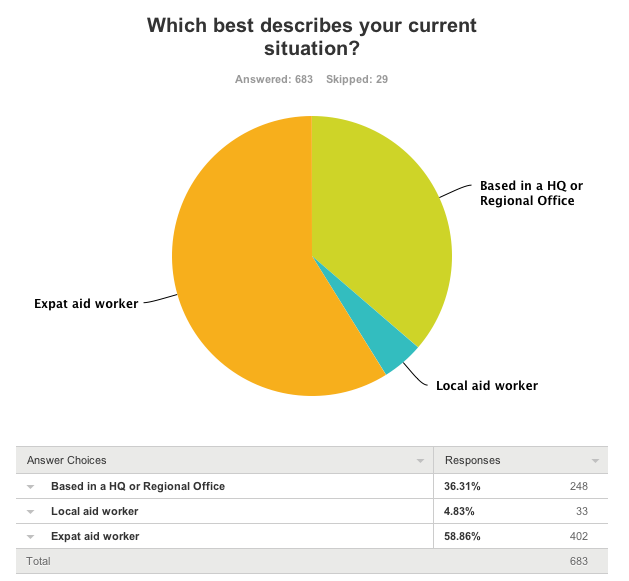Question 60: “Please elaborate on your views about the future of humanitarian aid work.”
The majority of respondents who have answered this question thus far seem to have focused their comments on things ultimately to do with technical delivery, implementation and efficiency. But a few have chosen take on what I consider to be probably the most important question facing the humanitarian aid and development industry today.
“I think the aid industry is still figuring out what its role should be and how it should have an impact – and the people who can support that (taxpayers, donors, etc) still aren’t sure about its value. I am hopeful but somewhat skeptical that the aid industry will continue to grow and always have a positive impact, as a result.”
This response hits it on the head. What is our role, as aid workers and aid organizations, vis-à-vis the bigger picture? Maybe times were simpler 30 years ago, before Rwanda, or 20 years ago, before Hurricane Mitch and Kosovo, or 10 years ago, before The Tsunamis. Now, in a post-Haiti earthquake and full-on Syria, South Sudan, Central African Republic period the standardized, pat answers fall flat. That famous quote about aid being “a measure of humanity, always insufficient…” (widely attributed to ICRC) is great marketing but it doesn’t really help us analyze either the increasingly complicated contexts where we work, or the less obvious, sometimes long-lasting effects that we often have on those contexts.
“I think the line will become more and more blurred between humanitarian aid work and military aid/stabilisation/restructuring/military operations in the future and we will need to stop pretending that aid organisations are not implementing the policies of donor governments and are not neutral (in the vast majority of cases) and are spreading the capitalist ideology of the “western” world.”
This response hits closer to home with reality than many of us wish was the case. It seems clear that the humanitarian principle of impartiality and neutrality are aspirations, not descriptions of how things are in fact.
“Humanitarian aid will always be needed and will have a positive impact on lives, however I am increasingly concerned about the reality that we are responding to political crises and conflicts of which there is no end in sight and no political will to solve. Humanitarian aid cannot and should not be used as a political tool and the frequency of how often that is happening currently is worrying.”
And then…
“I hope that the amount of cash we funnel through humanitarian aid will change; though that’s unlikely given the governments who need to support their foreign policy interests. I do think that aid as we are currently doing it is on track to become irrelevant and boring, and not a core part of change-making in the world.”
Personally, I remain a believer in what I call the humanitarian enterprise. I think we have a role to play in changing the world for the better, and I hope that we can find a way out of the irrelevant-boring loop.
What do you think? What is our role? What does our future look like?
Take the aid worker survey. Comment in the thread below this post. Talk to us on Facebook.


 Follow
Follow

